'How a $10k poker win changed how I think'
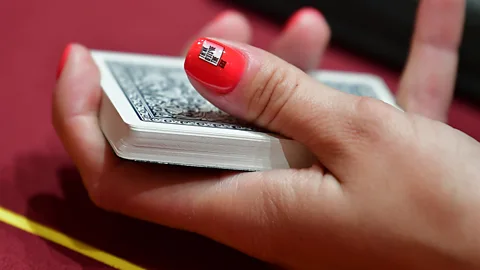 Getty Images
Getty ImagesWhen amateur player Alex O'Brien unexpectedly won an online poker tournament, little did she know that she'd be pitted against one of the game's most controversial players. A stellar team of poker pros offered to train her, and she discovered how poker can transform how you see the world.
One dark December afternoon, a message on my phone lit up like a warning signal.
“Are you in?”
This was the third time in two days that Philipp Kiefel, my poker coach, had asked me to sign up to play in a specific online tournament. It had a whopping first prize of $10,000 (£7,000/€8,250), and he thought it would be good practice. I'm a science writer, not a professional player, and had taken up the game initially as a hobby, but then started to study it in earnest to help me research a non-fiction book about how poker can enhance your critical thinking.
However, I was out collecting my daughter from school, and nowhere near my laptop.
“Picking up Ava,” I replied.
I felt guilty, but I had no interest in playing that day.
“You have 26mins before late registration closes,” he insisted.
“Will make it,” I capitulated.
Walking home was no longer an option, so Ava and I jumped in a cab and got home with just a few minutes to spare. She went to her room to play with her Lego and I sat down at the kitchen table to play with some strangers online – totally unaware of the impact it was about to have on my life.
That day, I would beat 1,666 other players to win the tournament and take the $10,000 prize.
My unexpected victory was just the beginning. Over the course of the following months, I would be pitted against a controversial player I had never met, notorious for his bombastic Instagram lifestyle and negative comments about women. I would be thrust into 15 minutes of fame in the poker media, drawn into the wider issue of sexism in the game. And I would be offered training by some of the world’s best poker coaches – idols of mine who have won millions of dollars through their skills, and who would go on to become friends. Along the way, the experience taught me how to think differently about the game – and the wider world, too. It elevated my mindset in a way that I started to see everything differently. And it all began at my kitchen table that December afternoon.
You may also like:
For the past few years, I've been working on a book about the mental upsides of playing poker. In the process of writing, I realised that I would need to include my own experiences, and show my reader I know what it takes to play and win. But I'm just an amateur player. I enjoy the game the way some people love yoga or running. So, like many of those people, I got myself a coach – Kiefel, a German online poker pro.
The online tournament that he had encouraged me to play was called a "freeroll" – and this was one reason why I had been reluctant to sign up. Since there's no entry fee, what tends to happen in a freeroll is that most players will undervalue their chips, play with little care and just spew off their stack. They perfectly display human psychology in action: give people something for free and they will value it less than something that they paid for. I had no desire to waste my time playing in what I believed would be a game of chance. Kiefel however had a different view. Playing with players who were less invested, he said, was a good thing: "Play your game and you will crush them". And crush them I did.
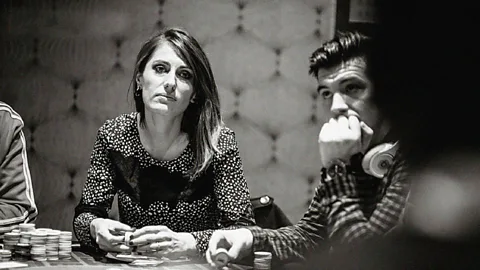 partypoker
partypokerTen seconds and four high-pitched OhMyGods after the win, I was on the phone to him. The grin stretched all over his words: "See what happens when you play rested and with focus?" He deserved to gloat. This victory was as much his as it was mine. He had never given up on me even though for nearly a year I repeatedly kept breaking his cardinal rule – don’t play when tired, stressed or distracted. I had been all of those things, just like any working parent during the Covid-19 pandemic.
The tournament was over within three and a half hours, in time for bedtime stories. The story that night was called "How Mommy won", which concluded with us both jumping up and down on the bed and her getting the Ninjago Lego set she’d had been asking for. Tonight we were both going to sleep happy – or so I believed.
We are told not to check our email before bedtime, but I did. Later that night, there was an email from GGPoker, the online platform that had hosted the tournament: "What an incredible achievement, beating such a huge field of players!" They’d be in touch to arrange the "heads-up match" with Dan Bilzerian. Wait, what? Who? What heads-up match? When? Kiefel was baffled too. What we did know was a heads-up game can be a bigger deal. These are essentially aggressive duels, played one-to-one, and usually involve high stakes.
I didn’t have to wait long for answers. They came at me in a Twitter storm. One post that particularly stood out was from a female online poker pro called Vanessa Kade. She wrote that it was "hilarious and perfect" that a woman (me) had won the tournament to face Bilzerian, given his past comments on social media about female poker players. In a now-deleted tweet in 2017, he had told the poker pro Cate Hall that: "I want to bet against you because you are a woman and women can't play poker."
Another tweet, from a poker coach based in the US, was directly addressing me:
"..sincere congrats, and NOT a dig on you personally in any form. Hoping that you can use this opportunity for the good in the efforts for decency, respect, and systemic inclusion for women in poker."
Just what had I let myself in for? And who even was Dan Bilzerian?
In all the years of watching poker, reading up on events and learning about players, I had never heard his name, let alone met him. Yet just a few days before the tournament he had been made one of the ambassadors for GGPoker. I was also unaware of the controversy that had unfolded with his appointment. It had been set off by an online spat between him and Kade. "The idea that this guy is being validated as the face of poker really sucks," Kade had tweeted. Bilzerian, bolstered by the might of his tens of millions of followers, fired back: "Quiet hoe, nobody knows who you are." So ensued a contentious narrative that would repeatedly flare up and take hold of the poker world for months.
 Alamy
AlamyBilzerian is not a professional poker player and his claims of winning tens of millions playing poker are hard to verify. In fact browsing through his Instagram feed you’d be hard pushed to find much poker content. What you will see is a display of guns and girls. In one shot he is standing bare-chested in a red car wearing red shorts and a Santa’s cape surrounded by seven women in boudoir lingerie. In the next, he's posing with military style weaponry, and in another, playing chess with giant wads of cash either side of the board – a post he captioned "A game of kings". But it's his words that have attracted the most criticism. "Women are like dog shit, the older they get the easier they are to pick up," he once tweeted. And in 2017, he posted on Twitter: "It's national Women's Day, be thankful, they are good for so many things!" alongside an image of him in a hot tub with four barely clad women and a half-naked fifth bent over while he ate a meal from her back. The backlash was significant enough to be picked up in the UK tabloids. (Bilzerian did not respond to BBC Future's requests for comment about the views expressed in his social media posts and the criticisms that followed.)
So when the news broke that a woman was now due to face Bilzerian in a heads-up match, it travelled like wildfire and the narrative took off on its own. Within days of my freeroll tournament win, I was profiled by PokerNews.com. But I wasn’t sure if I wanted any of it.
I also had a bigger problem: I didn’t know how to play heads-up poker. It’s a completely different game. You can’t hide in heads-up play. You either fold and lose, or you have to try to win the hand. In multi-player games, you can be more selective, but in heads-up you are forced to play all types of hands – even those that you’d normally discard without a second thought. If you are not aggressive, you will have a tough time. And crucially, it requires you to have a much more precise understanding of the game and its subtleties.
While I was worrying about my lack of skill, the online chatter continued and expectations grew. One person suggested I give the money back. This sudden exposure made me feel like a trapped animal.
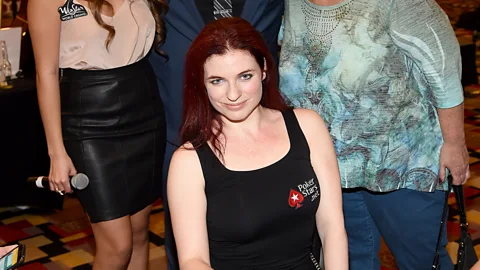 Ethan Miller/Getty Images
Ethan Miller/Getty ImagesSometimes when you're in trouble, others will leap in to help. And that is exactly what Jennifer Shahade did. I had met the grandmaster chess player a year prior in her home city of Philadelphia, where I interviewed her about pattern recognition and strategic thinking for my book. We had known each other for only two hours, yet she took the leap that declared: "I am on your team". Shahade, who is also an ambassador for the poker website PokerStars, had seen the news but hadn’t weighed in publicly as she didn’t want to give Bilzerian even more attention, especially when many other strong voices had pointed out the negative. She told me she had been inspired by my story, and wanted me to enjoy and learn from the opportunity to play on a big stage, rather than see it as a burden or risk of getting heckled.
So, she explained, she would introduce me to a good friend of hers: a heads-up specialist and genius, who would be happy to dedicate some time to prepare me for the match. To my shock, that person was Olivier Busquet – one of the best heads-up coaches in the world. His name may not be familiar outside poker, but I can tell you that when I heard this, I felt my body contract, forcing me to take a deep breath. This was a pro I did not need to look up. I had watched him play on TV numerous times, listened to him commentate poker games and had seen him win big – he has made millions of dollars. And now Busquet was going to coach me. Even Kiefel was stunned (and thankfully also excited).
Training with Busquet would show me how the most successful poker players think – and along the way, I would learn a few things about my own mindset too.
Thinking imperfectly
With a perfect mathematics SAT score, an aptitude for numbers, a thrill for risk-taking and a highly competitive spirit, Busquet had all the requirements for becoming a successful financial trader. He had started playing poker to develop his trading skills, but became obsessed with the game instead.
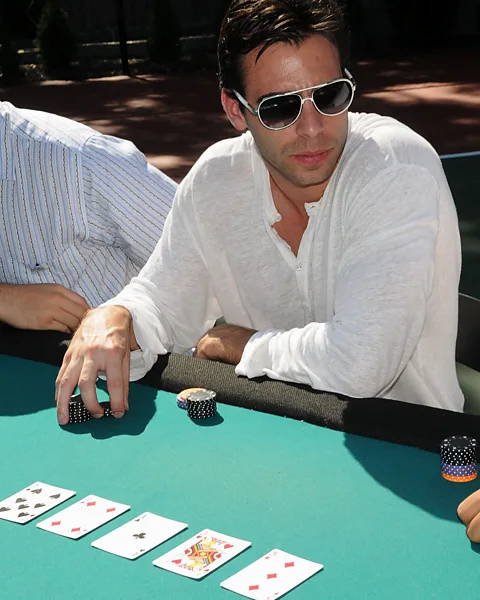 Shane Gritzinger/WireImage
Shane Gritzinger/WireImageIt is not unusual for traders to become poker players, and vice versa. The co-author of the Mathematics of Poker Jerrod Ankenman, for example, was a poker player before he got into trading. He found the perfect fit with Susquehanna, an international financial trading company founded by poker players. The company has an entire gaming blog dedicated to strategy, probability, science and data analytics. The core skills traders and poker players need are practically the same, Ankenman told me. Both have to diversify risk and maximise expected value by evaluating risk-to-reward, free from emotions, all while paying attention and noticing behaviours in environments of imperfect information. (Note I didn’t say "incomplete information". That is because game theorists regard information that you don’t have, but others do as imperfect if the rules and payoffs are known to all players or incomplete if the rules or payoffs are unknown. Trading markets can sometimes be seen as games of incomplete information.) Ultimately, what both successful traders and poker players must be good at is probabilistic thinking.
What does that mean? Say I have a coin and I am going to flip it and ask you to make a prediction. In this situation, what most of us think of as a "prediction" is "heads" or "tails." However, a trader or poker player would say "equally likely to be either" and act accordingly. Even though probability is a mathematical framework that is key to decision making in poker, and maths is important in the game, you don’t need to have a PhD in it to succeed in poker.
Ask Busquet what he thinks it takes to excel in poker over the long-term, and he will tell you of three core competencies you need to have: strategic thinking, emotional resilience and psychological awareness.
Perhaps the most prevalent output from this trifecta is that poker players are less results-orientated. Instead they focus on the process. I have heard this from other professionals too. Poker pro Jamie Kerstetter told me how this mindset has benefitted her: "It means being less hard on myself when something turns out poorly, as long as I did everything I could to achieve a good outcome."
To poker players, losing is part of a winning strategy. This may seem paradoxical, but real life is not too dissimilar to a poker game. In life, too, we can do all the right things and still lose. When Shahade and I talked over lunch in Philadelphia, she had told me that poker has taught her to think more in probabilities in all aspects of her life. The biggest risk in life, she told me, is to take no risk at all.
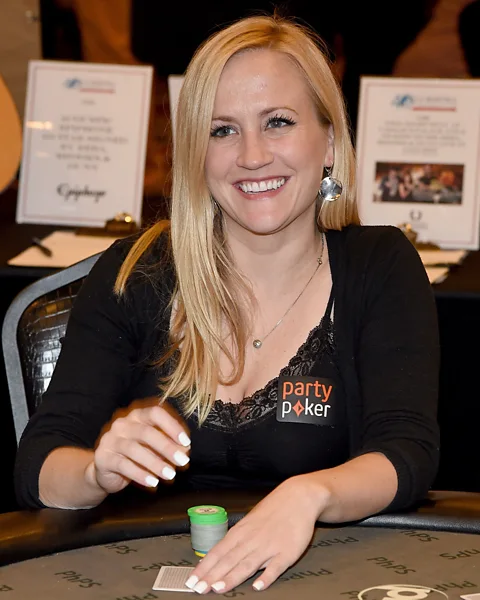 Ethan Miller/Getty Images
Ethan Miller/Getty ImagesI heard a similar message from the poker pro David Lappin about the parallels to real life. Poker can provide a lesson in humility and is a good metaphor for the sort of chaotic randomness of the world, he told me. Just like life, poker isn’t rigged, even though it could feel like that sometimes. You realise your role in all the proceedings isn’t central, except to you. Lappin suggested that the grand error most people make is that they apply some sort of cosmic meaning onto events: "I think you become really kind of familiar with the idea that you don’t matter much and that’s really good because we don’t matter as a species either." He told me he used to be a more temperamental person before poker, but through the game he has learnt to stay in control and emotionally take a middle ground, "even if everything’s going wrong". Successful poker players don’t get distracted by their own emotional state and instead can focus on that of their opponents, and so strategise accordingly.
Thinking strategically
A second vital thing I learnt from Busquet, in my first lesson, was a mistake I was making that was stopping me building an effective strategy. Unlike chess, many people struggle to see poker as a strategic game. Non-poker players tend to assume that the main requirements for winning are to be a body language expert and good at bluffing. I blame how popular culture often uses poker as a prop to describe scenes of distress and high tension, associated with gambling. Yet there are plenty of strategic similarities between chess and poker, which is why many chess players like Shahade pick up poker and vice versa.
In our first lesson, Busquet told me of a specific move I am never to make, after I had made a bet when I shouldn't have.
"OK. Will do," I replied.
"Aren’t you going to ask me why?"
This felt like a test I had failed, which made me want to hide under a rock. What I learnt was that I wasn’t asking enough questions. Poker players ask themselves a series of questions for every single hand they play, trying to gauge "range", which essentially means the scope of possibilities in the game ahead. What is my range? What is my opponent’s range? How do those ranges interact? And how does it affect the value of my hand? At what frequency would I bet, call or fold with my hand?
Based on the concept that you only have partial information, poker players consider the range of all possible things that could happen. They then tally this thinking with risk assessments and the evaluation of risk and assign probabilities to it.
I realised that being able to ask the right questions when we have little information to hand, while also operating under duress, is a real skill we could all use – and not just in poker. This has been particularly clear during the Covid-19 pandemic, when we all became risk assessors. All activities required us to evaluate the risk to our health, as well as gauging what risk we are willing to accept.
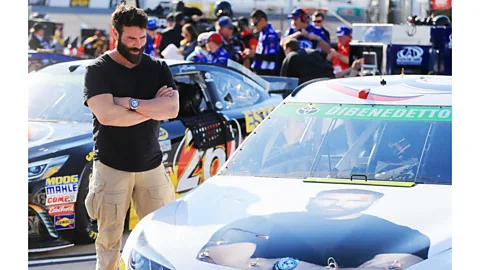 Daniel Shirey/Getty Images
Daniel Shirey/Getty ImagesNo-limit Texas Hold’em is the most popular form of poker and it’s the one I play. In this game, each player is dealt two cards (pocket or hole cards) face down. Next there is a round of betting when players can decide to play or fold their cards. Players still remaining will see the flop. These are the first three cards of a total of five (community cards) that are dealt out face up in the middle. After that a further round of betting. Then the 4th card, called the turn is revealed. Once again, a round of betting, after which the final and 5th card, the river is revealed. Finally, one more round of betting before players still remaining in the hand will show their two cards. The winner at showdown is the player who has made the best hand using the hole cards and the cards in the middle to make the best possible five card poker hand.
The two cards a player is dealt are also referred to as starting hands. There are 169 starting hands in No-limit Texas Hold’em. The playability and equity of the hands you play changes depending on a number of variables which dictate your actions. To help with their first strategic or betting decision, some poker players refer to charts. These are models that have been mathematically calculated by a computer for every position on the poker table and the corresponding chip stack size. They are visualised as grids of 169 squares and the ranges are colour coded. Memorising these is key to understanding your own position vs your opponent’s. Understanding ranges is key to winning.
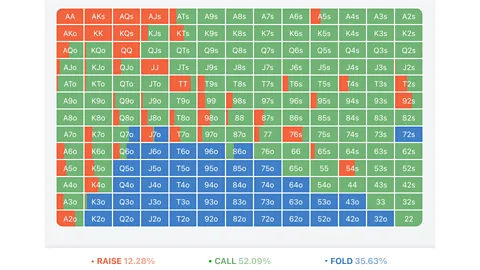 Pokercode
PokercodeFollowing our initial conversations, Busquet started me off with 10 charts to study that are specific to heads-up play. A lot to learn, but there was absolutely no reason to panic. I had plenty of time.
This wasn’t the first time I would be wrong. A couple of days after my first lesson, I got a call from Mel Moser, who was the marketing manager at GGPoker. She had "great news". They would be sponsoring my entry into the World Series of Poker (WSOP) Heads-up tournament – a $10,000 buy-in event. "I hope you are excited!", she said.
I was not. What I felt was unprepared, and out-of-my-depth. My attempt to throttle the rise of panic was futile. My attempt to feign excitement even more so. "Oh… wow… this is …. amazing… thank you," I replied.
Poker's World Series is a series of tournaments that takes place over six-to-eight weeks in Las Vegas each year. In terms of importance, it’s the "Wimbledon" of poker. Thousands of players. One goal. To win the bracelet at the WSOP main event. It’s the ultimate prize in poker. If you love this game, this is what you dream about. Never did I imagine I’d be playing my first ever WSOP event online, let alone in a format I knew nothing about. GGPoker figured it would be good experience to play at this level to help prepare me for the match with Bilzerian. The list of players in that tournament was a "who's who" in high-stakes poker. These were gods. I felt like a sacrifice.
I no longer had several weeks to prepare, I had a few days.
I threw myself into training, devoting as many hours as I could, all the while juggling the pressures of work, parenting and the pandemic. Sometimes it got too much. One night in the middle of the UK's winter lockdown, just before my daughter fell asleep, it became clear she had picked up on fears of the coronavirus: "Mommy, I don’t want to be alone. I don’t want you to die," she said. I comforted and held her until she fell asleep, breathing calmly. I let the tears break free. Then I walked down into the kitchen and made coffee. It was 8pm. Time to study.
The next time I cried was when I crashed out of the WSOP Heads-up online event in the first round. The tournament was on 3 January, which is why, instead of joining a Zoom party with friends, I spent New Year's Eve studying my charts until early hours in the morning. After I lost, I don’t remember how long I sat staring at the screen after I had played my final hand. The tears didn’t come straight away. First came exhaustion – I hadn’t slept more than four hours a night in days. After that came pain – I had been battling the fear of failure for days and failure had won. It hurt.
"You have barely scratched the surface of poker pain," Busquet told me. Professionals encounter it all the time. "If I was playing the same tournament and had the same result. I would not have felt badly," he said. It was comforting to hear him explain that losing in the first round is always possible and never unthinkable. This, I would learn, is because a professional player's edge is intimately connected to a concept they call "variance".
Thinking variably
You will often hear poker players use the term "variance" and "luck" to explain outcomes. In poker these two words signify important aspects. When you sit down at the tables, you sign up to achieve a certain distribution of outcomes. Your win or loss is akin a random draw from that distribution. "Variance" is a statistical computation on the (theoretical) distribution of outcomes, while "luck" is the draw from that distribution that is realised. This distribution can be influenced by a number of variables such as the structure of the game, your opponents' strategy and skill, and your own. Even though I had studied intensely for days I still hadn’t covered the basics of heads-up play, let alone started thinking about this.
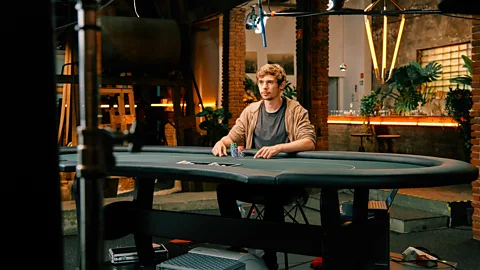 Pokercode
PokercodeThe value that your hand has against that of your opponents is called "equity distribution", the poker pro Fedor Holz told me. Holz has a reputation as a wunderkind – a title the 27-year-old deserves, given that he has amassed $40m (£28m/€33m) in earnings. He was sitting in his flat in Austria and speaking to me over Zoom for a one-on-one post game analysis session that GG had arranged for us. "The way you are thinking right now, is how most players think. It isn’t how most of the best players think," he said.
We talked about the downsides of focusing too much on an opponent's playing habits. Holz sees this as a weakness because it's not based on a theoretical understanding of the perfect play. The mindset that he asked me to adopt instead is to always assume that my opponent is a very good player and to therefore always play optimal strategy. And only then am I allowed to shift from the theoretical approach to respond to the information I pick up about who I'm up against.
To build a strategy to beat Dan Bilzerian, once again I needed to ask questions: how is my range plotted against his? What are the strongest hands I have and what are the strongest hands he could have? For whom is this board better? Is this card better for him or me? And by how much? Crucially, these questions are independent of an opponent's style, and they are independent of Bilzerian. In short, his approach matters far less than my own.
Before the end of our session Holz invited me to join Pokercode, a poker coaching community he set up where players meet to discuss hands, learn from one another and attend interactive online coaching sessions run by high-profile pros. I was blown away. The repeated generosity and support by the poker community humbled me and I didn't know how to thank Holz. He did and told me: "Just win!"
Throughout my training, I had met so many supportive professionals like Holz, Busquet and Shahade, who were rooting for me to beat Bilzerian. For them, my experience spoke to deeper problems with gender attitudes within the industry, which many of its players have been facing up to in recent years. I realised that these poker pros who donated their time were not simply focused on how to play their own best game – they also wanted to make poker itself better.
Thinking equally
Setting aside that this complex game is super fun to play, one of the main reasons that drew me to poker in the first place was that it is a male-dominated field. I have spent my life proving that my gender doesn’t define or inhibit my abilities and skills. I intentionally use the gender-neutral form of my first name because in science writing, too, female writers encounter negative bias.
There is no reason why poker should be dominated by men. The cards are gender blind. It's stereotypes, sexism and misperceptions that keep women from the tables, rather than ability.
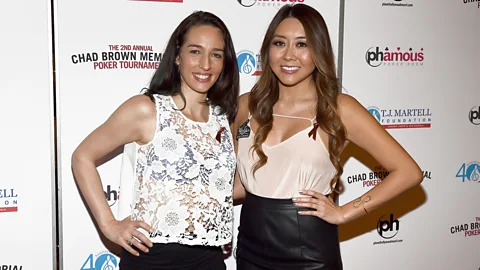 Ethan Miller/Getty Images
Ethan Miller/Getty ImagesPoker still has a long way to go, but there has at least been some progress. When Kara Scott started out her career in poker and broadcasting back in 2005, poker was heavily marketed towards men in a way that left women out of the conversation completely. During the WSOP main event it wasn’t uncommon to see strip clubs set up stands outside the hall, with strippers pillow-fighting inside, and poker magazines such as Bluff would hold their annual party at a strip club. It was pretty standard for the many printed poker magazines that existed then to use women as a visual prop for men, often pictured with cards between their cleavage or poker chips on their nipples lying on a poker table.
In those days, women were used as decorative objects. In Bilzerian's images on social media, Scott says she sees flashbacks of a time she thought poker no longer lived in. As an anchor for WSOP, who is also a sideline reporter for the event, she now presents her own poker show with fellow poker pro Maria Ho. "Nobody fell over in a faint because two women were doing a poker show together," she told me, and is glad that today this is seen as pretty standard.
Female voices are far more prevalent and less decorative today. What’s more, women have proven they not only can play, but they can win. If you are still wondering if poker is a skill-based game, Vanessa Kade is that proof. A few weeks ago, she delivered the poker world a Cinderella story no one saw coming. Kade, who had devoted time and effort to study, was rewarded by winning the biggest online poker tournament this year and pocketing $1.5m (£1m/$1.2m) in the process. Now everyone knows who she is – including Dan Bilzerian.
Thinking next
If this was a fictional sports movie, this story would end with a blow-by-blow account of my match against Bilzerian. You'd see me struggle, battle and beat him, despite the odds, then the credits would roll. But that's for another day, and it's not how I choose to end my story today. Instead, I find myself reflecting on where this path had led me. When I started, it seemed like the most important thing was beating a man I'd never met, in a match I didn't know how to play. But along the way, I've learnt so much more about myself, and what I value.
I know that if the cards go my way, I can beat Bilzerian. If the game goes the other way, that's OK too. What I've actually won is bigger than a heads-up match: a group of poker friends who have my back and a new way of thinking about my life. From now on, I'll always remember the lessons of my tutors: curiosity is everything, losing is a part of playing, and our opponents in life are less important than the choices we make ourselves. And you know what? I'm ready.
--
Alex O'Brien is a writer, and her upcoming book about the mental benefits of poker, called The Truth Detective, will be published in early 2022.
If you liked this story, sign up for the weekly bbc.com features newsletter, called "The Essential List". A handpicked selection of stories from BBC Future, Culture, Worklife, and Travel, delivered to your inbox every Friday.
